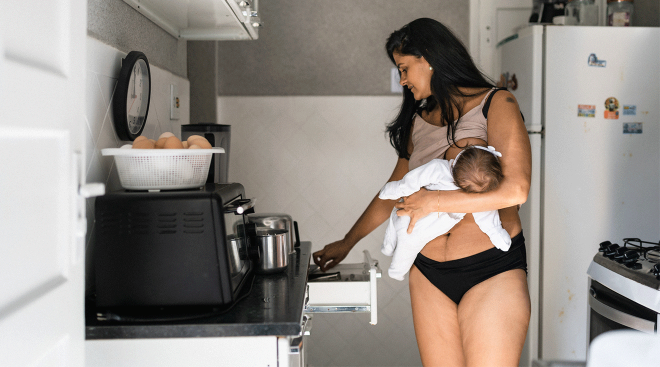- You made it to the finish line! But that doesn’t mean baby is going to take the hint. Lots of littles stick around for a few days—or even a week or so—beyond their due date. Hey, it’s comfy and cozy in that uterus of yours. (Also, remember that calculating due dates is not an exact science—so your projected timeline might be off.)
- The pelvic pressure is real. Baby is probably very low and engaged preparing for delivery. You may find yourself waddling. You might also experience some shooting pains in your crotch region as nerves get compressed.
- Average baby weight at 40 weeks is about 7.6 pounds—give or take. Of course, there’s a hearty range, so don’t be surprised if you wind up with a petite bundle or a future linebacker.
- Once you go past your due date, you might be scheduled for a biophysical profile. This is an ultrasound and nonstress test to make sure baby is doing well and you have sufficient amniotic fluid levels.
Week 40 of pregnancy can be mentally rough, since you’ll be constantly wondering when baby will decide to make their entrance and you may be questioning every twinge you have. If you notice a decrease in the way baby moves, call your healthcare provider immediately. Try not to stress, and rest assured that baby will arrive when they’re ready—and your body will give you the right signals that it’s time.
Your 40-week fetus is continuing to grow hair and nails. And baby at 40 weeks is keeping up that lung development, too. Baby’s organs are fully developed. These ready-to-go organs will help baby function on their own really soon–with the additional support of their parents, of course!
By week 40, baby is also mastering the art of coordination. Impressively enough, they can now respond to sounds, blink, clench their first and even turn their head. They are gearing up for their first interactions in the real world.
Now, baby is wiggling their way further down into the pelvis–getting comfy and settling in for their big debut. In fact, at this point, baby can be head down, feet down or sideways.
How big is baby at 40 weeks pregnant?
At 40 weeks pregnant, baby is the size of a watermelon. A full-term 40- week baby may measure around 20 inches give or take from crown to heel and weigh approximately 7 to 10 pounds.
40 weeks pregnant is how many months?
You guessed it—at 40 weeks pregnant, you’ve completed the nine+ months of pregnancy! You made it!
40 week ultrasound
Once you’ve completed a full-term pregnancy and reached 40 weeks, your doctor will likely want to do a biophysical profile. In case you missed it, this is a two-fold test. You’ll have a non-stress test, where baby’s movement and your contractions are monitored to see how baby’s heart rate reacts. Both a biophysical profile and NST are generally done twice a week once you’ve passed your due date. You’ll have a 40 weeks pregnant ultrasound to see what the amniotic fluid levels look like.
If the results of the biophysical profile and non-stress test, and/or the 40 weeks pregnant ultrasound, suggest that baby would be better off “on the outside” than in utero, then an induction may be ordered. If everything looks good, you’re back to the waiting game. Hey, baby can’t stay in there forever!
During these last weeks of pregnancy, the same symptoms you’ve been having will likely continue. Your main job is to hang in there as you keep experiencing these:
Leg cramps
Stick with the calf and hamstring stretches to keep leg cramps from messing with your sleep.
Pelvic pressure
Baby may drop even lower in your pelvis, making your pelvic discomfort worse.
Trouble sleeping
If you can’t sleep, it’s okay to get up and do something else, but keep to a calming activity such as reading or writing in a journal. Don’t start cleaning out your freezer or doing a Zumba video. Rest.
Fatigue
The fact that you can’t sleep isn’t really helping here. But since you may not have any plans, you may be able to sneak in an extra nap here or there—or at least take some quiet time to relax when you’re tired.
Contractions
Those Braxton Hicks contractions may eventually turn into the real deal, so if it seems like you’re having a lot of them, start timing them to see how far apart they are. If they get closer together and start to feel painful, you’re in an early stage of labor.
Anxiety!
Baby will get here when they get here. Do your best not to stress.
You might be 40 weeks pregnant with no signs of labor. But at 40 weeks pregnant, signs of labor will be here very soon. Call your doctor right away if you have contractions that are more than a little uncomfortable or keep coming at regular intervals. The other 40 weeks pregnant sign of labor to look out for? A leak or flow of amniotic fluid—this means your water has ruptured or broken. You’ll likely know because it will be truly watery, not like typical discharge, and it doesn’t stop. At first you might think it’s pee, but then you will realize—nope! You’re in labor! Call your OB.
Is it normal to be 40 weeks pregnant?
Of course! (Although at this point, it may feel like you’ve been pregnant forever.) Sometimes, the timing for pregnancy can be confusing. You may hear people talk about it lasting for “nine months,” but a normal pregnancy lasts 40 weeks—and that’s longer than nine months. That’s why your OB has been referring to each stage of your pregnancy in weeks, not months. It may feel like baby’s taking a long time in there, but at 40 weeks, they’re right on time!
What causes a baby to be overdue?
There’s no one particular reason why baby misses their due date. It could run in your family; maybe you were even born late! It also can occur during first-time pregnancies or if you had a prior pregnancy where baby showed up late. Baby’s sex can also play a role, as some believe boys are more likely than girls to make a delayed arrival. And frequently, confusion over the date of your last period can lead to miscalculation of your due date—in that case, baby’s not late at all!
How long does it take to go into labor after 40 weeks?
Your baby is unique—and that means the timetable for their arrival is all their own. Generally, a baby can be born within two weeks of their due date before being considered “post-term,” or overdue. We know you want baby to just get here already, but hang in there! Your provider should keep a close eye on you and baby to make sure you’re both doing well.
At 40 weeks pregnant, you may be getting antsy—after all, this is supposed to be your last week of pregnancy! You may be curious how to induce labor using natural methods. We recommend taking long walks and having sex. (Both are fun pastimes and could cause your body to start the process.) If you want to try acupuncture, that’s considered safe too. However, don’t take herbal supplements or drink castor oil—many doctors say those DIY methods are unsafe and probably won’t work anyhow. You might have heard that stimulating your nipples can induce labor. It can, but doctors recommend you don’t even try it. In fact, nipple stimulation can cause contractions that are too strong and may put baby’s well-being in jeopardy—not worth it.
Now that you’ve reached your due date, your doctor might talk to you about inducing labor medically. Whether or not this is necessary will have to do with how baby is doing in there. (The doctor might schedule this now if you have complications or are 40 weeks pregnant with twins.) If baby is perfectly healthy and you have no complications, you might not need an induction at all and can keep sticking it out, even if it takes a couple more weeks. (Yes, weeks. Though chances are high that you’ll go into labor naturally by the end of next week.) It might be worth it to know that you waited it out until baby was truly ready.
Congratulations and welcome to the start of your newest adventure! There are lots of highs and lows in the first week [of parenthood], and the best way to approach it is to frame it that way. There are bumps, challenges, and hiccups, but they'll largely pass. Remember that prioritizing your well-being is the best possible way to start off this new chapter in your life!
Ready or not here comes baby (sooner or later). Your due date has arrived, and now it’s a waiting game. Here’s what you can do as you eagerly anticipate your little one’s debut.
Re-make your bed
Just in case your water breaks in the middle of the night, be prepared and put a waterproof mattress cover on your bed. You may want to keep it on even after baby comes to catch other messes like breast milk, spit up and pee.
Say “ommmmm
If you’re feeling anxious in advance of baby’s birth, take some time to chill out and relax. Find a meditation app you can use whenever you need to shut off the busyness inside your brain and focus on calming mindfulness. It’s also a great way to wind down for bedtime, and it may even help you catch some of that elusive sleep!
Let it go
When a contraction hits, you may tense your entire body to help you bear the pain. That can actually make matters worse, so instead try going the opposite direction and relaxing your body as much as possible. One way to help you do this: Close your eyes and mentally scan your body from head to toe, stopping at the places where you feel tense and releasing that tightness in your muscles. Pair it with some deep breathing, and before you know it, the contraction will be over.
Gas up the car
The last thing you want to do as you’re driving to the hospital is stop for gas. This is one of those simple chores you (or your partner!) can do this week so you’re ready to go when baby is on the way.
Frequently Asked Questions
How much movement should I feel at 40 weeks?
As a general rule, you should feel 10 baby movements every single hour. At this point, baby’s movements are less like solid kicks and more like larger rolls and swishes–which still count! But how much movement you feel really all comes down to you knowing your baby best. By 40 weeks, you’ve probably already mastered baby’s movement pattern. If you feel like baby is being extra quiet and not moving as much, practicing kick counts every hour can be reassuring. If you notice that baby is not moving at all within the hour, this could be a sign of fetal distress, and a call to your provider should be your next step.
How do I know if I’m leaking amniotic fluid?
Amniotic fluid can release in a huge rush or a slow and steady leak. Check the consistency, color and smell of the liquid. With amniotic fluid, the texture will be more watery rather than a normal thicker-like discharge. You might also see white flecks in the liquid from baby’s outer coating, aka the vernix. Amniotic fluid will also look generally clear–although it can have a pink or yellow hue to it. Lastly, you typically won’t smell an odor with amniotic fluid. Since increased vaginal discharge is normal in pregnancy, it’s very common to question if you’re leaking amniotic fluid or not. Call your doctor if you’re having second thoughts, and they’ll identify what’s going on.
Can sex induce labor?
Having sex won’t induce labor unless baby and your body are ready to go into labor. But we shouldn’t ignore the fact that the prostaglandins in semen have been shown to help ripen the cervix–getting it ready for birth. Even more, the oxytocin released during an orgasm (and resulting contractions) might help push someone over the threshold who was already ready to go into labor. All in all, if you’re having a low-risk pregnancy, there’s definitely no harm in having sex to try and induce labor.
Why does baby need a vitamin K shot?
Experts recommend giving baby the vitamin K shot after birth to help prevent the risk of hemorrhage. Vitamin K is the key component in the body’s ability to clot and help it stop bleeding. And since babies are born with very low amounts of vitamin K, this shot acts as an extra boost to dramatically protect them from bleeding if they experience any trauma or have unknown microbleeds. In fact, studies show that babies who do not receive the vitamin K shot are 81 times more likely to develop severe bleeding than those who get the shot.
What are the pros and cons of going past 40 weeks?
The pros and cons of going past 40 weeks in pregnancy depend on many factors. Generally, here are the typical pros and cons of going past week 40 in pregnancy:
Pros of waiting:
- Avoiding the possible cascade of medical interventions
- Naturally giving your body enough time to prepare for labor on its own terms
- Giving baby enough time to be fully nourished and develop their brain and lungs
- Honoring the entire physiologic process of birth
Cons of waiting:
- Higher chance of developing hypertensive disorders like preeclampsia, gestational hypertension and HELLP
- The possibility of your placenta becoming insufficient
- Increased chance of getting meconium–aka baby’s first poop–in the amniotic fluid
- Increase for oligohydramnios (low amniotic fluid), which can cause the umbilical cord to get pinched and restrict blood flow to baby
- Giving birth to a large gestational age baby
- Increased risk of stillbirth
My son was over a week late. I tried like heck to walk him out, but it was the end of July (read: 90-degree heat), and with every block I hoofed, my legs would swell. By 4 p.m. every day, my unrecognizable 'sausages,' as I called them, had to be propped up on a pillow.
Please note: The Bump and the materials and information it contains are not intended to, and do not constitute, medical or other health advice or diagnosis and should not be used as such. You should always consult with a qualified physician or health professional about your specific circumstances.
Aleesa Ponce, APRN, CNM, is a certified nurse midwife at the Orlando Health Physician Associates with over 20 years of experience. She spent five years as a nurse in the NICU at the Orlando Health Arnold Palmer Hospital for Children, where she was also a member of the neonate resuscitation team in the delivery room.
Lucy Chapin, CNM, is a certified nurse midwife and holistic health coach at Mad River Birth and Wellness. She trained as a midwife at Yale University and went on to as spend more than 10 years attending births in a hospital setting.
March of Dimes, What Is Full-term?, September 2018
Mayo Clinic, Overdue Pregnancy: What to Do When Baby's Overdue, July 2022
Johns Hopkins Medicine. Calculating a Due Date
Cleveland Clinic, Signs That Labor Is 24 to 48 Hours Away, April 2021
Scientific Reports, Alterations of Pregnant Gait During Pregnancy and Post-Partum, February 2018
American Pregnancy Association, Lightning Crotch Pain During Pregnancy
Mayo Clinic, Fetal Development: The 3rd trimester, June 2022
Stanford Medicine Children's Health, Biophysical Profile
Cleveland Clinic, Kick Counts, July 2022
University of Florida Gardening Solutions, Watermelon
American Pregnancy Association, What Changes Are Occurring with Your Body at 40 Weeks Pregnant?
Lamaze International, How Far Along Are You? Counting Pregnancy by Weeks, Months & Trimesters, September 2021
Cleveland Clinic, Biophysical Profile, December 2022
Johns Hopkins Medicine, Biophysical Profile: BPP Ultrasound and Nonstress Test
Mount Sinai Hospitals, When You Pass Your Due Date
MedlinePlus, Aches and Pains During Pregnancy Bethesda (MD): National Library of Medicine (US), November 2022
Children's Health at Montefiore, Pregnancy: Dropping (Lightening), July 2023
Sleep Foundation, How to Sleep Better While Pregnant, March 2023
American Pregnancy Association, Fatigue During Pregnancy
American College of Obstetricians and Gynecologists (ACOG), How to Tell When Labor Begins, November 2021
Institute for Quality and Efficiency in Health Care (IQWiG), Pregnancy and birth: When Your Baby’s Due Date Has Passed, March 2018
Cleveland Clinic, Water Breaking, October 2022
Stanford Medicine Children's Health, Post-Term Pregnancy
American College of Obstetricians and Gynecologists (ACOG), When Pregnancy Goes Past Your Due Date, November 2021
Cleveland Clinic, Truth or Tale? 8 Ways to (Maybe) Move Labor Along Naturally, December 2018
Cochrane Library, Acupuncture or Acupressure for Induction of Labour, October 2017
BMJ Open, Effectiveness and Safety of Herbal Medicines for Induction of Labour: A Systematic Review and Meta-analysis, October 2018
Journal of Pharmacopuncture, Effect of Castor Oil on Cervical Ripening and Labor Induction: A Systematic Review and Meta-Analysis, June 2022
Cleveland Clinic, Can You Pump to Induce Labor?, July 2023
Mayo Clinic, Labor Induction, May 2022
American Journal of Obstetrics and Gynecology, The Optimal Timing of Induction of Labor in Uncomplicated Twin Pregnancy, January 2020
Institute for Quality and Efficiency in Health Care (IQWiG), Pregnancy and birth: When Does Labor Need to Be Induced?, March 2018
Harvard Medical School, Exercising to Relax, July 2020
Lamaze International, Releasing Tension in Labor Helps Relieves Pain, August 2021
Centers for Disease Control and Prevention (CDC), Vitamin K and the Vitamin K Shot Given at Birth
American Pregnancy Association, Baby Development Month By Month
Learn how we ensure the accuracy of our content through our editorial and medical review process.
Navigate forward to interact with the calendar and select a date. Press the question mark key to get the keyboard shortcuts for changing dates.
















































